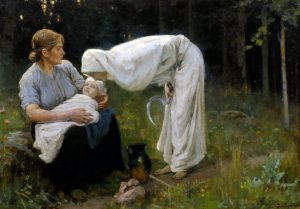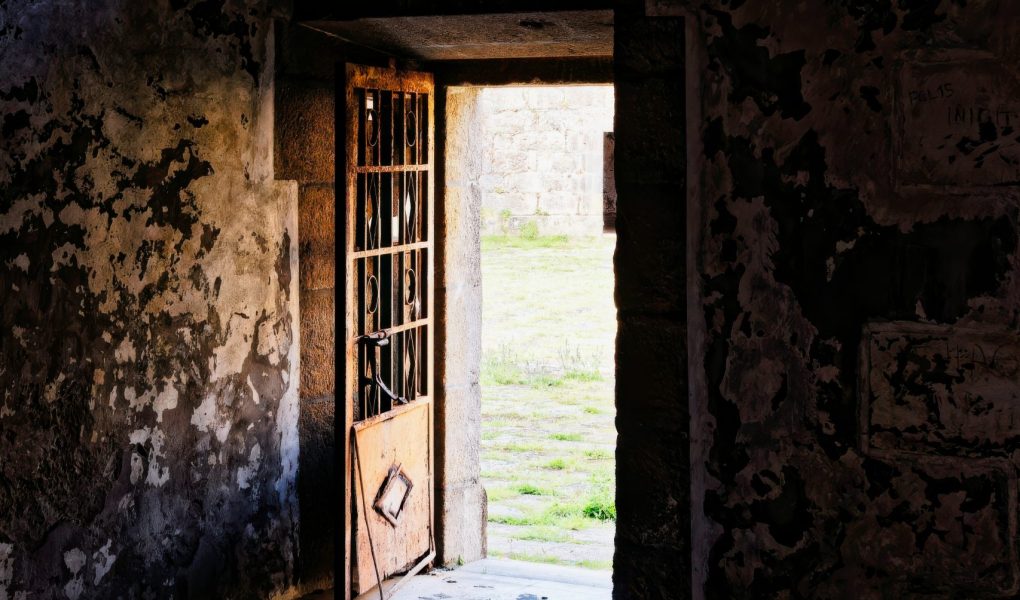This post was written by Kathryn Charles, the current Humanities Center Intern.
My uncle died the week before my wedding. It was one of my first close encounters with death, and so my grief, although real, was also strange and unexpected. In the days after his death, I found myself spontaneously weeping over cheese on my zucchini (my uncle was a wizard at disguising vegetables). At other times, I couldn’t help chuckling at the thought of my uncle making a perfectly inappropriate joke in angel form at my sealing. I logically knew that he was gone, but it didn’t feel like he was gone at all—in fact, he felt more present in my life than he ever had before.
Less than two weeks after his funeral, I found myself in the catacombs of Paris on my honeymoon—a quintessentially romantic excursion, I know. Surprisingly, I felt comfort in the mass grave of nearly six million as I wandered through aesthetically amalgamated femurs and skulls. It was an unavoidable reminder that “For dust thou art, and unto dust thou shalt return” (Genesis 3:19). Instead of causing me distress, this blunt exposure to death shaped death into something familiar, something that simply is. Something surprisingly soft.
With death on my mind, I have recently become acquainted with death’s softness and perhaps even its knowability through art and literature. The humanities are resplendent with interpretations of death—mortality is unavoidable in studies of and by human beings. With its abundant interpretations, the humanities can act as a mediator in our acquaintance with death in all its shapes and forms, exposing its mystery and perhaps even suggesting that death might one day become a friend.
In the painting Nāve (Death), Janis Rozentāls portrays the Latvian goddess of death and new life, Zemes Māte (Mother Earth), coming to claim a deceased child. Although the living mother is angry and hesitant to offer her child, Death comes as a friend. She is peaceful, non-threatening, and natural in her bare feet. Death bows to the mother and child as if bowing in prayer. Her sickle is an allusion to the harvest of things cut in their time and ready to be celebrated for their bounty. This is not a death to be feared.

The musician Andrew John Hozier-Byrne reimagines the Greek myth of Icarus in the song,“I, Carrion (Icarion).” In this rendition of the myth, Icarus is not merely a victim of his own ambition but a figure who, in falling, transforms as death becomes a gateway to something more eternal, fully embraced in love. The title hints at the connection to death, decay, and rebirth, emphasizing the cycle of life and death. In sum, Icarus’s death is not an abrupt crash into the end, but a natural passing through in which the lines become blurred in where this life ends and the next begins. He is essentially embraced into the ground—death—which is also love: “Once I had wondered what was holding’ up the ground/ But I can see that all along, love, it was you all the way down.”
I hope that death is simply a falling into love; death cannot be frightening if it is simply an enfolding by those who are familiar to us. My grandma recently told me that instead of fearing for her life on a recent helicopter ride (my cousin was flying the helicopter and having been there for her driver’s ed, death felt like a real possibility), she felt content with a potential crash because, well, she would just get to see my uncle. While this statement, made so matter-of-factly, was unexpectedly funny, I think it’s beautiful that my grandma’s fear was taken out of death because death gained a face and a name.
I hope that death is transient, acting like a door into new life, and that once death is no longer something to be feared, we might be allowed to stand at the door and watch. I can almost imagine that if we pay attention just outside of the door, we might see glimpses or whispers of those on the other side, and they are not sleeping.
On a recent shift at the Provo City Center temple, I was assigned to stand outside of the celestial room, greeting and directing those who came in and out. Every time a person passed through the doors, I was afforded a glimpse into a silently teeming celebration—someone had just received their endowment and so the room was especially full with family. I would catch a vibrant look into a high and holy life, and then the door would close.
I think sometimes the door between the living and the dead is a fine, perhaps imagined line between our memory of the dead and their influence on the other side of the veil. Our memory of those we lose keeps them close, and possibly their closeness to us keeps them in our memory. This semester in a class on Marilynne Robinson, who especially loves the idea of a transient death, I came across the following passage in her novel Housekeeping:
“There is so little to remember of anyone—an anecdote, a conversation at table. But every memory is turned over and over again, every word, however chance, written in the heart in the hope that memory will fulfill itself, and become flesh, and that the wanderers will find a way home, and the perished, whose lack we always feel, will step through the door finally and stroke our hair with dreaming, habitual fondness, not having meant to keep us waiting long.”
Last week, a little over a month after my uncle’s death, we had our typical monthly dinner in my grandparent’s backyard. Several years ago, my uncle moved into the house next door to his childhood home—the home where my grandparents still live and where I have attended family dinners weekly or monthly for as long as I can remember. These family dinners are always beautifully the same: always the same rolls, jello, salads, chicken, always the same sun-bleached tablecloths, and the same rickety folding chairs, and the same chipping red paint on the treehouse in the old apple tree. Last week, my uncle wasn’t there at the beautifully same family dinner to call me “Bug,” or bring his signature cheesy vegetables, or loudly verify that he was my favorite uncle. But his life is right there—with his house there, his family there living the same compounded memories of the same Sunday dinners, he was absolutely there. So even as I grieve, I can hope that someday death will be as familiar to me as the consistent reunion of Sunday dinners, greeting me like an uncle and a friend.






